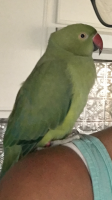I would *LOVE* to slap anyone who says birds go through a "bluffing" stage! It's not "bluffing" that they are doing, just extremely "loud" communication! Any bird that is labeled a "bluffer" is honestly a bird that is saying "Hey! If you wont back off, I'll bite! Please leave me alone!" And they are saying this loud and clearly! However, when you ignore this behavior, guess what happens? Your bird can stop warning you and actually start biting! Or another alternative is that they simply give up and feel like they have no say in the final outcome.
If you are stepping into parrot keeping with the belief that birds bluff, please do not get a bird. However, if you are willing to understand that this is a form of communication, in the nicest and "loudest" way possible without causing pain, and you can take a step back to assess the situation and figure out how to change it in your favor while making it rewarding for the bird, then please, all means, go for it!
Barbara's Force Free Animal Training Talk: Do Animals Bluff?
IRN's and Caiques are both considered to be difficult birds... IRN's because they are *SO* easily misunderstood, caiques because they have such high energy! Caiques you could say are like huskies or german shepherds or well, farm dogs! They need a job, they need enrichment, they need an outlet for all that energy! IRN's perhaps more like little dogs... when they [little dogs] are fearful and constantly put into situations where they go into a fearful state, then that state is somehow rewarded, they become aggressive dogs - biting out of fear. Except with ringnecks, "we" tend to ignore this state and keep pushing them beyond what they are comfortable with, and they bite!
The best thing you can do for *ANY* bird you have is to learn how to communicate with them in such a way that it doesn't cause them undue stress! This is where positive reinforcement training/clicker training/force free animal training/ABC's of behavior/applied behavior analytics comes into play! (when done correctly)




